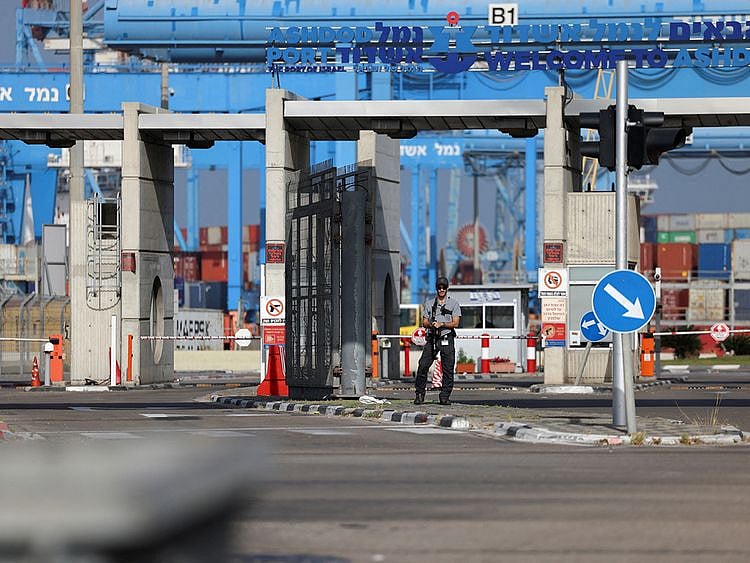Six months into Gaza war, Israel faces deepening isolation
US demands concrete steps to increase aid supplies, Israel opens more border crossings

Jerusalem / Cairo: Six months into the war in Gaza, the killing of a group of aid workers by an Israeli air strike summed up both the dire humanitarian crisis and the lack of a clear way out of a conflict that is leaving Israel increasingly isolated.
The attack on Monday night that killed seven staff of the World Central Kitchen (WCK) aid group, including six foreigners, has angered even some of Israel’s closest allies, adding to growing pressure for an end to the fighting.
Israel’s military has acknowledged the strike was conducted mistakenly by its forces and apologised for the “unintentional” deaths of the seven, who included citizens of Britain, Australia and Poland, a dual US-Canadian citizen and a Palestinian colleague.
But that has done little to ease growing alarm abroad, where public opinion even in traditionally friendly countries like Britain, Germany or Australia has swung against the Israeli campaign in Gaza, launched after the Hamas-led attack on Israel on Oct. 7.
President Joe Biden, who has come under growing pressure from his own supporters to end the fighting, said he was outraged by the convoy attack. On Thursday, following a call with Netanyahu, the White House demanded “concrete and measurable steps to reduce civilian harm” and said future US support would be determined by Israel’s actions.
Increased aid access
On Friday, Netanyahu ordered the reopening of the Erez crossing into northern Gaza and the temporary use of Ashdod port in southern Israel as well as increased access for Jordanian aid through the Kerem Shalom crossing in southern Gaza.
With Gaza in ruins, most of the 2.3 million population have been forced from their homes and now depend on aid for survival, a bitter humiliation during the holy month of Ramadan when Muslims around the world consume traditional Ramadan meals and desserts to break their fast after sunset.
“We had some hopes before Ramadan but that hope vanished the night before the fasting month began,” said 33 year-old Um Nasser Dahman, now living with her family of five in a tent camp in the southern city of Rafah, where more than half of Gaza’s population is now sheltering.
“We used to be well off before the war but we’ve become dependent on what limited aid there is and our relatives,” she said, via messaging.
Even before the attack on the convoy, Israel had been isolated diplomatically, with the UN General Assembly calling repeatedly for humanitarian ceasefires, and under heavy pressure to step up aid deliveries in Gaza, where aid groups say famine is imminent.
While Israel says its forces have killed thousands of Hamas fighters and destroyed most of its fighting units, months into the war, Israeli troops are still battling groups of fighters in northern and central Gaza, in areas that had apparently been cleared in the early stages of the war.
Prime Minister Benjamin Netanyahu has so far resisted pressure to change course, insisting that Hamas remains an existential threat to Israel that must be destroyed before lasting peace can return.
“Victory is within reach. It’s very close, and there is no substitute for victory,” he told a delegation of Republican Congress members in Jerusalem on Thursday, appealing for more budget support, hours before the call with Biden.
Cycle is repeated
The Israeli public has largely continued to support the war aims of destroying Hamas and bringing home 134 hostages still held in Gaza. But Netanyahu himself faces a growing protest movement and demands for new elections that opinion polls indicate he would lose heavily.
“I feel strongly that all those outside of Israel calling for a ceasefire do not understand the situation here,” said Wendy Carol, a 73 year-old writer and start-up founder from Jerusalem. “We’ve had so many incursions and invasions and we will stand as a democratic, Jewish country.”
While peace talks have been going on, hopes of a breakthrough that could secure a pause in the fighting and enable the return of the hostages have been repeatedly dashed and Hamas leaders say they can keep fighting for much longer.
“Six months have passed and Al Qassam Brigades is still able to keep up the fight against the Zionist occupation army,” said senior Hamas official Sami Abu Zuhri.
The war was launched after a Hamas-led attack in which more than 250 hostages were seized and some 1,200 people killed, by Israeli tallies, in the worst single day loss of life in Israel’s history. The campaign has been the bloodiest ever for the Palestinians, with more than 33,000 killed so far, according to Gaza health authorities.
More than 250 Israeli soldiers have been killed since the start of the ground invasion, in addition to almost 350 who were killed on Oct. 7.
Palestinian casualty figures do not generally distinguish between fighters and civilians and Israel says more than 10,000 fighters have been killed, a figure not confirmed by the militant groups. But more than a third of the dead have been children, according to United Nations figures.
The scale of the casualties has caused mounting global alarm and demands for a halt but for people in Gaza, the wait continues.
“I believe everything has an end, the war will end,” said Um Nasser Dahman in Gaza. “But when?”
Sign up for the Daily Briefing
Get the latest news and updates straight to your inbox
Network Links
GN StoreDownload our app
© Al Nisr Publishing LLC 2026. All rights reserved.